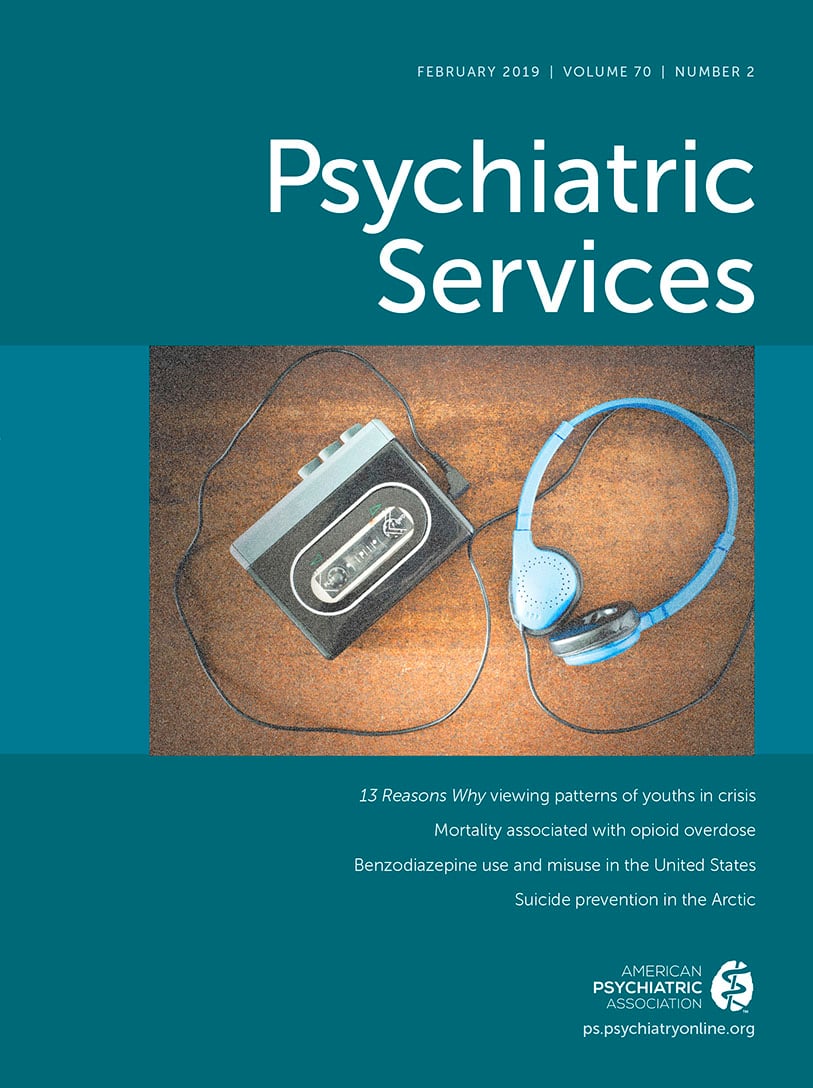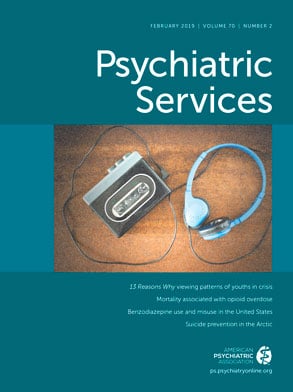Approximately 500,000 indigenous people inhabit the circumpolar North, and suicide rates in Arctic communities, particularly for young people, typically exceed national averages (
1). The high rates of suicide among indigenous youths in the Arctic are a relatively recent phenomenon, coinciding with colonial intrusions into traditional lifestyles, rapid modernization, cultural disruption, and policies of cultural assimilation (
2). Lack of service system infrastructure, distrust of formal services, systemic discrimination, underemployment, and collective disempowerment increase suicide risk for Arctic indigenous youths (
1,
3). Yet the holistic perspectives (i.e., connections with land and spirituality) reflected in the traditional culture of many circumpolar indigenous communities can support mental health (
4).
Suicide prevention efforts should be tied to identified strengths and vulnerabilities, but the challenges of conducting rigorous research and evaluation in the Arctic hinder the development and implementation of best practices. Suicide prevention research in these locations is constrained by geography, lack of culturally relevant measures with thorough psychometric testing, small populations, and research strategies that prioritize local control and cultural relevance over generalizability and rigor-enhancing scientific conventions (
5). Another constraint is the definition of evidence, which has often limited the criteria for determining intervention effectiveness to randomized controlled trials at the expense of evidence from other knowledge systems. Arctic mental health researchers have called for a “circumpolar comparative framework . . . to design, conduct and interpret interventions [to] enable lessons to be learned and shared” (
5). Such a framework will better enable indigenous communities, service providers, researchers, and policymakers to address the critical health disparities that affect indigenous youths across the Arctic.
Over the past decade, the Arctic Council, the intergovernmental forum of Arctic states and permanent participants (representing indigenous peoples’ organizations), has become a forum for collaborative efforts to highlight the problem of suicide and potential solutions. The 2011 Arctic Health Declaration in Nuuk, Greenland, focused on enhancing mental health and the prevention of substance abuse and suicide. Under the 2013–2015 Canadian chairmanship of the Arctic Council, the Sharing Hope initiative supported international teams of Arctic researchers to identify evidence-based interventions that increase mental wellness and prevent suicide among circumpolar indigenous communities (
5). The final report revealed a dearth of rigorously tested interventions for these communities. More recently, under the United States chairmanship (2015–2017), a multicountry team built on this work with a new mental health initiative called Reducing the Incidence of Suicide in Indigenous Groups: Strengths United Through Networks (RISING SUN). The aim of RISING SUN was to develop a toolkit of common outcomes and measures to assess suicide prevention efforts across the Arctic—a first step toward harmonizing data and increasing collaborative research and evaluation efforts (
6).
Regional Workshops
The RISING SUN initiative used workshops and a virtual Delphi process to establish consensus on suicide prevention priorities. A scientific advisory group (SAG) comprising clinicians, researchers, and youth leaders from Arctic Council member states and Permanent Participants guided the process. At meetings in various locations (Anchorage, Alaska; Tromsø, Norway; and Iqaluit, Canada), advocates, clinicians and researchers from Arctic indigenous groups gathered alongside policymakers, academics, and clinicians. Each workshop prioritized indigenous community participation and dedicated time for group discussion.
Participants consistently noted that suicide prevention requires holistic problem solving that considers the many strengths of circumpolar indigenous people as well as the wide range of threats they face. Threats include climate changes that impinge upon livelihoods; corporate or government incursion on land traditionally used for reindeer herding or subsistence practices; the high turnover of health care providers; and scarcity of health care providers in many Arctic rural communities with appropriate language skills and cultural and historical understanding. In some communities, these threats compound the effects of social inequity and alcohol and substance misuse on health and well-being. Colonial practices that disrupted indigenous families, language preservation, cultural ties, and social cohesion left an intergenerational legacy of historical trauma, changing the trajectories of subsequent generations. Cultural continuity, community action, indigenous ways of knowing and healing, relationships to land and water, and language revitalization remain sources of collective resilience.
The 2015 Alaska workshop featured small group discussions about the structure of RISING SUN, approaches to suicide prevention, and the Delphi process. Participants stressed that it is important for researchers working in communities to be oriented to the cultural context, to believe that communities can heal themselves, and to emphasize community strengths rather than demoralizing statistics. They promoted efforts to seek local expertise and indigenous knowledge by asking communities what they already do to prevent suicide and how to build on that. Participants in the Alaska workshop and those at the May 2016 meeting in Tromsø provided feedback on the various aspects of the Delphi process. They questioned whether the methods and the presentation of the data were consistent with indigenous ways of building consensus or presenting information. In both workshops, the SAG identified options to accommodate these viewpoints.
The final workshop took place in March 2017 in Iqaluit. Participants identified priorities for suicide prevention in the community and in the regional and global context (
7). At the community level, advocating for and securing long-term, sustainable funding to support lifelong holistic approaches to mental wellness were prioritized. On a regional level, full implementation of indigenous suicide prevention strategies arose as one of several priorities (
8). At the regional and global levels, participants emphasized the benefits of sharing information, coordinating programs, collaborating in research, and making Web-based tools available to support evaluation.
Delphi Process
RISING SUN identified collective priorities through an iterative, consensus-building Delphi method involving a diverse group of advocates, clinicians, policymakers, indigenous community members, researchers, suicide survivors, and tribal leaders. The National Institute of Mental Health RISING SUN working group led data collection, analysis, and reporting.
The SAG nominated 300 people to the Delphi panel. Of these, 159 people representing eight Arctic states agreed to participate, and 140 completed round 1. Among the 159 panelists, 54 (34%) self-identified as researchers, 40 (25%) as indigenous community members (including native youths and elders), 35 (22%) as clinicians and service providers, and 30 (19%) as policymakers. Of the 140 round 1 participants, 62 (44%) were from the United States, 43 (31%) from Canada, 29 (21%) from Scandinavian countries and Greenland, and six (4%) from Russia.
In round 1, panel members responded to the question, “In addition to reducing suicide deaths, what are the most important outcomes that suicide prevention interventions should achieve in Arctic communities?” by listing up to five outcomes they considered most important. Participants reported over 600 outcomes for suicide prevention.
Round 1 results were collated into a consolidated list of 99 outcomes. In round 2, the panelists selected their top 25 outcomes. In round 3, panelists ranked each outcome on a 3-point scale for relevance to an Arctic context, feasibility, and immediacy of impact. The final ranked list of outcomes represents the weighted individual rankings for each outcome summed across all three criteria and divided by the total number of responses [see
box].
As a group, the RISING SUN Delphi outcomes convey the importance of recognizing suicide risk and protection as multifactorial, shaped by influences at multiple levels. Several themes arose. First is the necessity of incorporating core indigenous values in health care for indigenous communities, especially cultural humility, community engagement, indigenous ways of knowing and healing, and self-determination. The importance of community relationships emerges through the priorities of increasing connectedness among individuals and their peers, families, and communities; strengthening intergenerational relationships; and bolstering community-based crisis management and prevention. Second, the family context is identified as a critical protective environment for fostering resilience to adversity. Third, health care and other suicide prevention services must be designed explicitly to meet the needs of indigenous people, whose histories and ways of life are often distinct from those of the clinicians who serve them.
To complement the Delphi panel, three authors—two from the United States (CA and SR) and one from Canada (SC)—hosted community discussions to gain additional perspectives on priorities for suicide prevention interventions and desired wellness outcomes. Community member participants emphasized that recognizing cultural perspectives and holistic health as well as indigenous practices that promote protective factors can play an invaluable role in achieving community well-being and resilience. The participants in the Alaska discussion groups also stressed the significance of cultural history, the importance of a sense of belonging, and the benefits of traditional ways of transmitting well-being and resilience through indigenous languages, stories, dances, and subsistence hunting and gathering of traditional foods.
Next Steps
RISING SUN developed from the recognition that existing interventions are inadequate to address the high numbers of deaths by suicide and high rates of attempts. Similarly, existing evaluation approaches for assessing efficacy or effectiveness of suicide prevention interventions are inadequate in the Arctic context. The development of appropriate assessments for new and existing interventions is a prerequisite for disseminating and scaling up what works. An explicit goal of RISING SUN is to facilitate collaborative research by providing a common set of community-based, prioritized outcomes and measures. These can facilitate data pooling and ensure adequate sample sizes in order to aid community-driven efforts to identify what works best within and across a range of Arctic communities. In communities where it remains more feasible to apply practice-based, experiential evidence to guide decision making, agreed upon prioritized outcomes and measures could help guide intervention selection. To that end, RISING SUN has produced online tools for stakeholders to use alongside those developed specifically for their communities (
www.mhinnovation.net/collaborations/rising-sun/rising-sun-toolkit). Measures already exist for some of the prioritized outcomes, but many must be adapted and validated for different Arctic social contexts.
Attempting to achieve the prioritized outcomes for suicide prevention will require mobilization of resources and, in some cases, enactment of policies (e.g., to reduce adverse childhood experiences). Sustainable benefits will require collective long-term action to reduce the disproportionate burden of suicide in the Arctic.

